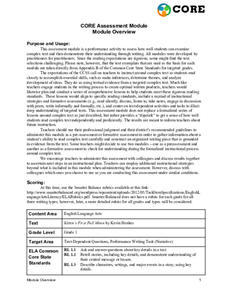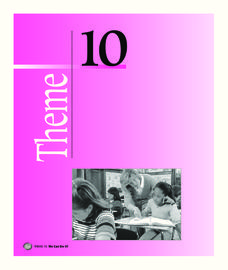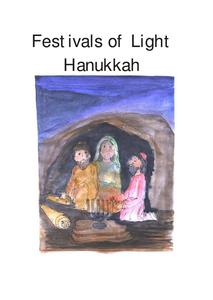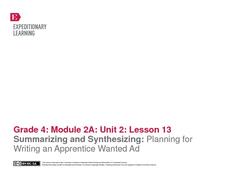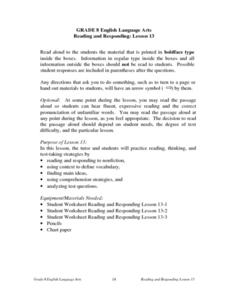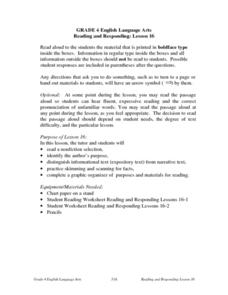Museum of Disability
Buddy, The First Seeing Eye Dog
Learn about how the seeing eye dog program began with a reading lesson about Eva Moore's chapter book, Buddy, The First Seeing Eye Dog. With vocabulary words, discussion questions, and extension resources, the lesson is a great way for...
Bantam Books
The Tempest: Think-Aloud Annotation
It can be difficult to refer back to a text when analyzing it, so annotation is a great tool for kids to track what they are reading. A thorough and well-organized lesson guides learners through the process of annotating William...
California Education Partners
Kitten's First Full Moon by Kevin Henkes
A 3-day exam assesses readers' comprehension. After hearing a passage from the story Kittens First Full Moon by Kevin Henkes, scholars work with a partner to discuss and sketch what they found memorable. Peers share their final products...
Benjamin Franklin Tercentenary
Benjamin Franklin and Learning a Lesson
Examine stories with a moral in a character development instructional activity. The class reads a short story written by Benjamin Franklin in which he pays too much for a toy whistle. Individuals then make text-to-self connections and...
Museum of Disability
Stand Tall, Molly Lou Melon
Help to create the next generation of friends with a lesson about accepting people who are different. As kids read Stand Tall, Molly Lou Melon, they answer a series of discussion questions and activities about making friends with others.
Center for the Advancement of Ethics and Character
Charlotte's Web: A Story About Friendship
Strengthen the bonds of friendship within your class with a reading of E.B. White's award-winning novel, Charlotte's Web. Focusing on the unique characters in the story and the relationships they develop, young readers draw from their...
Museum of Disability
Stand in My Shoes
Stand in My Shoes, a story by Bob Sornson, is an effective way to teach young learners about empathy and making friends. Once pupils read through the story, they answer a series of discussion questions and complete reading activities...
Houghton Mifflin Harcourt
Home Sweet Home: English Language Development Lessons (Theme 5)
Through grand discussion, picture cards, and poems, enhance language proficiency with a Home Sweet Home themed unit created to support English language development. Each lesson follows a listen, speak, move, and/or look routine that...
Curated OER
Teaching Reading Comprehension through Social Studies Readings
Examine how immigrants have changed the environment of the United States. Individually, middle schoolers will take a pre- and post-test to assess their reading comprehension. In groups, they compare and contrast the religions of...
Houghton Mifflin Harcourt
Surprise!: Extra Support Lessons (Theme 2)
Surprise! is the theme of a unit covering such topics as consonants, blending, short vowels sounds, high frequency words, and number words. The unit's lessons also include teachable moments covering story structure, illustrations,...
Houghton Mifflin Harcourt
We Can Do It!: English Language Development Lessons (Theme 10)
English language development lessons are brought to you in poems, picture cards, and grand discussions in a We Can Do It! themed unit. Topics of discussion include daily challenges, parts of a whole, words that describe what we hear,...
Council for the Curriculum, Examinations and Assessment
Festivals of Light Hanukkah
Five sessions make up a lesson on the Jewish celebration of Hanukkah. After reading and teaching young historians the history of the Jewish holiday, learners explore the celebration through hands-on activities and collaborative learning.
Houghton Mifflin Harcourt
Nature: Friend and Foe: English Language Development Lessons (Theme 6)
If readers don't understand key portions of a text, it may seem more like a foe than a friend. The second resource in a series of three ESL lessons designed to accompany the texts in Nature: Friend or Foe makes the texts easier to...
Channel Islands Film
Dark Water: Lesson Plan 2 - Grade 3
A discussion of bioluminescence launches an investigation of animal adaptations. After re-watching the opening minutes of Dark Water, class members listen to a reading of What Do You Do with a Tail Like This, and then create a new animal...
Houghton Mifflin Harcourt
One Land, Many Trails: English Language Development Lessons (Theme 5)
English is not the only subject that requires its own set of vocabulary words—geography does too! A series of language development lessons designed to be used with Theme 5: One Land, Many Trails helps introduce readers to key vocabulary...
Curated OER
Author Study: Cynthia Rylant
Explore the life's work of one of the great children's authors using this ten-lesson author study unit. After first performing some whole-group research into the life of Cynthia Rylant, the class goes on to read six different stories,...
Prindle Institute for Ethics
My Dream of Martin Luther King
Conduct a book study of the story, My Dream of Martin Luther King by Faith Ringgold. Followng a read-aloud, scholars take part in philosophical discussions covering the topics of freedom, equality, race, and heroes.
EngageNY
Using Effective Search Terms: Researching Water Management
Discover how to use search terms effectively! Scholars continue their exploration of Charles Fishman's The Big Thirst, engaging in a read aloud and then answering text-based questions. Next, pupils learn about using search terms and...
EngageNY
Summarizing and Synthesizing: Planning for Writing an Apprentice Wanted Ad
In instructional activity 13 of this unit on colonial trade, young researchers learn about apprentices as they prepare to write help-wanted ads for the specific trade they have been researching. To begin, the class listens closely as the...
Student Achievement Partners
"The Glorious Whitewasher" from The Adventures of Tom Sawyer by Mark Twain with Mini-Assessment
It's the classic scene: Tom Sawyer is whitewashing a fence. Expose your learners to Mark Twain's humor while reinforcing reading comprehension. Eighth graders are encouraged to read and reread, achieving as much exposure to the text as...
Curated OER
Do You Want to Be My Friend?
Learners participate in a variety of emergent and early-literacy activities based on a "friendship" theme. Learners listen to the book Do You Want to Be My Friend by Eric Carle, then echo read, choral read, and independently read...
Curated OER
Lesson: Storyboarding Revolution
Kids consider revolution as a basis for creativity, art, and storytelling. After reading an excerpt from the book, Persepolis, learners choose one event from any world revolution to write about. They storyboard the event focusing on...
Curated OER
Reading and Responding -- Lesson 13
Fourth graders work independently or in a small group to (1) read a fictional passage, (2) use context to define unfamiliar vocabulary, (3) use comprehension strategies, and (4) make inferences. Reading passage and teacher script is...
Curated OER
Reading and Responding -- Lesson 16
Fourth graders work independently or in a small group to (1) read a nonfiction selection, (2) identify the author's purpose, (3) distinguish informational text from narrative text, (4) skim and scan for facts, and (5) complete a graphic...




